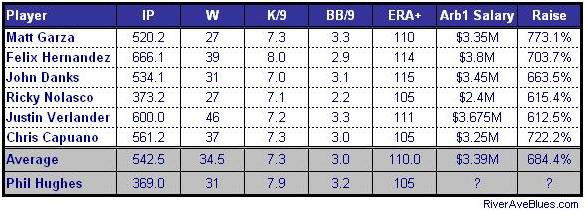
The Yankees have a few players eligible for arbitration this offseason, none more notable than first-timer Phil Hughes. After earning the league minimum or close to it over the last four seasons (or parts of them, anyway), Hughes will see his salary bump up into the seven figures this winter. How much exactly? Well let’s try to figure that out.
The entire arbitration process is pretty archaic, relying on old school stats that don’t tell the whole story to compare players with similar amounts of service time. Hughes will be compared to other pitchers when they hit arbitration for the first time, and his salary will be based on what they earned. Of course both the Yankees and Hughes want to avoid an arbitration hearing and agree to a contract beforehand, but his salary will still be determined in a similar manner.
Because of his 2010 season, Hughes has himself a damn fine arbitration case. He won 18 games and was an All Star, a huge feather in his cap. It’s basically irrelevant that he had the best run support in baseball even though it absolutely inflated that win total. The wins and All Star Game alone are enough to get him a substantial raise, but his other numbers stack up as well. I ran a B-Ref Play Index search to help dig up some similar pitchers, then picked out the best matches. As it turns out, Jeff Euston (the man behind Cot’s) published an article at Baseball Prospectus today (subs. req’d) looking at AL East arbitration cases, so that was helpful as well. Here’s who I came up with…

Those stats are leading up to each player’s first year of arbitration only; career stats don’t do us any good in this situation. I also ignored players that had signed contract extensions buying out their arbitration years because it skews the salary data, otherwise Randy Wolf, Gavin Floyd, Fausto Carmona, and Chris Young would have been included as well. For shame. The average salary in the player’s first year of arb and percent raise is a weighted average based on innings pitched. Nolasco’s relatively small workload will count less than Felix’s mammoth innings total; it’s only fair.
Garza might be the best overall comparison, though Capuano fits as well. Hughes’ strikeout rate is inflated a bit by his 2009 stint as a reliever; as a starter he’s got a 7.3 K/9 in his career, right on par with just about everyone else listed. If we apply that 684.4% raise to Phil’s 2010 salary of $447,000, he’s looking at a 2011 salary of $3,264,588. If we remove Felix since he’s clearly a notch above the other guys, it’s a 679.5% average raise and a projected $3,241,215 salary for Hughes next year. It’s a negligible difference as far as we’re concerned. Remember though, Phil’s got that All Star berth on his resume, something only two guys from the above table (Verlander and Capuano (naturally)) had at the time. That could push Hughes’ salary up towards $3.5M, and that’s a damn fine estimate of what he’ll be paid next season.
One thing is for sure, I had been grossly underestimating Phil Hughes’ earning potential. I had been under the assumption that he’d get a deal worth $2M or so for next season, maybe $2.5M if the Yankees were feeling charitable because I was ignorant to the comparables. He’s going to blow right by that amount and land a contract around three-and-a-half million bones, quite the payday for a 24 year old and a decent dent in the team’s bottom line.
Leave a Reply
You must be logged in to post a comment.